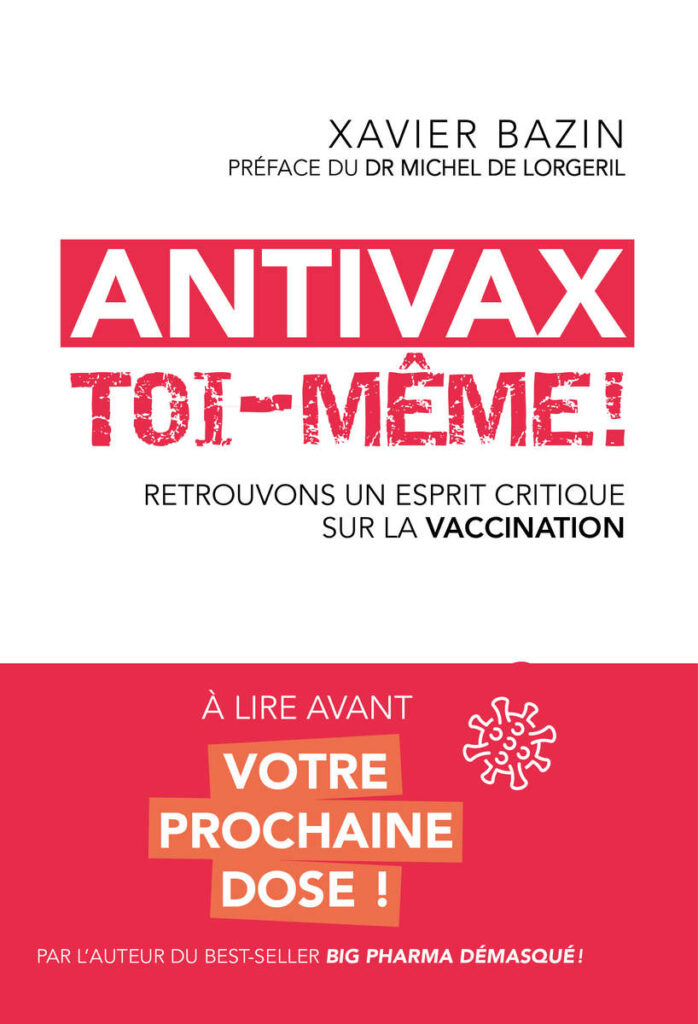In his book “Antivax toi-même”, published by Guy Trédaniel, the scientific journalist Xavier Bazin puts his foot down and challenges beliefs and prejudices about vaccination. His goal: to open the debate. Interview (part 1).
By Alix Jouan

The title of your book uses the term “antivax” in a somewhat provocative way, which is used today to designate people who are suspicious of anti-Covid vaccines. But in reality, it is all vaccines, even the most classic ones, that you are targeting. Aren’t you afraid of being labelled a “vaccine skeptic”?
In any case, from the moment you criticize vaccines, you are called an anti-vax or a vaccino-skeptic, terms whose main purpose is to discredit the person who speaks out to prevent people from being interested. So, either you keep quiet for fear of being categorized, or you have things to say, elements to share, and in this case, you are obliged to take this risk. I’m not afraid of that, even if it’s not pleasant.
A lack of scientific data
While reading you, we understand that there is a real debate to be had on vaccination, because there is obviously a lack of scientific evidence, both on the effectiveness and on the safety of most vaccines.
Yes, and I am very aware of the transgression of my statement. Unlike many people who say that they are not anti-vax and that it is just the anti-Covid vaccine that they are challenging, I go further. Of course, these vaccines, which are not vaccines by the way, made in a hurry and with a totally experimental technology, are probably going to be one of the biggest health scandals in history, but what they reveal, i.e. the way we perceive vaccination, the way we make studies on the effectiveness and the way we cover up the side effects, is not new and concerns all vaccines. When we look seriously at the history of vaccination, we realize that we are immersed in a sea of bad science and incomplete data: no large randomized clinical trials against placebo for most of the mandatory vaccines, no studies or censored studies on the toxicity of adjuvants, such as aluminum or mercury, no studies on carcinogenicity, etc. On the other hand, there is a lot of ideology and lack of reflection on the part of the medical profession.
First of all, don’t believe…
You even talk about a vaccine religion…
One of the problems revealed during the Covid crisis was the way the population, doctors, media and politicians accepted with closed eyes all the vaccine propaganda that claimed that two doses would be enough for a return to normal life. This was fundamentally based on a deep ideology, shared by the whole society, which is to think that vaccines are a magic wand, safe and effective. This is not true and there has been great disillusionment about it. If we don’t want this to happen again, we absolutely have to take a dispassionate look at our relationship with vaccination and return to a critical mind, with a much more scientific approach. I hope that my book will contribute to this.
Covid vaccines: a predictable inefficiency
You also explain that the anti-Covid vaccines were doomed to be ineffective, especially on transmission, simply because an injected vaccine acts on the general immune system, whereas a respiratory virus multiplies in the mucous membranes of the nose and mouth, which have their own immune system.
Yes, this is why Inserm was looking for a while to develop local vaccines in nasal spray. Pfizer is now being criticized for not having done a study on transmission, but in any case, with vaccines injected into the arm, it could not work. It was predictable. Similarly, experts like Prof. Raoult and Prof. Perrone said from the start that the probability that a vaccine could stop an epidemic of an emerging disease was almost zero. And this is what happened: vaccination did not stop the epidemic. On the contrary, it probably made it last by accelerating the constitution of new variants. We can see today that the countries that vaccinated the most have infinitely more cases of Covid than those that vaccinated little or not at all. So all this was predictable. What was less predictable, however, was the catastrophe of the adverse effects of these vaccines, which are very, very high in number.
Ignorant doctors
You speak of a sea of bad science. How do you explain the lack of critical thinking among doctors about vaccines?
I believe that there is first of all conformity and blind trust in the wisdom of the health authorities. The basic doctor does not have the time to go and check all the studies, so he trusts them without asking himself more questions. And if he did, what could he do? It would take him hundreds of hours to get into it, I know that. It’s really a lot of work to see the reality of the studies that have been done and to appreciate their limitations. It’s also a lot of work to get away from a lot of favorable preconceptions about vaccines that have been built up over time. Doctors only have a few hours of classes on vaccination in their university curriculum, which is not enough to develop a critical mind. They are not trained to recognize adverse events and when they see one, their first instinct is usually to dismiss it. It’s not what they injected that may have produced this or that reaction. This is called cognitive dissonance.
Good health more effective than vaccines
Doctors also say that if people started to doubt and stop getting vaccines, it would lead to the return of some major diseases. But is this true?
This goes to the heart of the vaccine religion. The medical profession as a whole is convinced that vaccines have enabled great advances in the fight against infectious diseases and that it is thanks to them that the great scourges of the end of the 19th and beginning of the 20th century were eradicated. But this is not true. It is rather the improvement of living conditions, hygiene and nutrition, especially for children, that allowed these advances. In my book, I show two important graphs with the evolution curves of mortality due to measles and whooping cough. For these two diseases, mortality was very high in 1900 and was reduced to almost zero in a few decades, even though there were still as many cases and there were no vaccines or antibiotics. Why did this happen? Simply because people were healthier, with more resistant organisms, thanks to better living conditions and a less deficient diet. That’s the revolution! Not vaccines.
“The microbe is nothing, it is the terrain that is everything,” said Claude Bernard. In the end, in this race for miracle products, aren’t we forgetting the basics of health and common sense?
Absolutely. Today, we focus solely on technological solutions, whereas we have proof that the most important thing is the field. We saw it again during the Covid period, when we hardly heard anything about vitamin D, even though we have known for decades that it is an extremely effective vitamin for improving the functioning of the immune system and reducing the risks of respiratory infection.
What about long-term effects?
The long-term effects of vaccination and multi-vaccination have never been studied either, either on an individual or collective level. You speak, for example, of a delayed effect on childhood diseases such as measles which, instead of occurring in childhood, can appear in adulthood with much more serious forms, when the vaccine no longer has any effect.
Yes, or it is the infants who will get the disease between 0 and 1 year, at the age when they are not yet vaccinated, but very vulnerable. This is what I call the side effects of vaccination, which are never taken into account, i.e. the shift in the age of the disease. Before, the mother who had measles as a child had strong antibodies that she passed on to her child during pregnancy. When the child was born, he or she was naturally protected during the critical 0-1 year period. Today, babies are no longer protected, because the antibodies of vaccinated mothers are not sufficient to be transmitted to the child. Another collective effect is that vaccination causes bacteria and viruses to mutate more. A study by Inserm, reported by Le Monde, shows how the pertussis bacterium has evolved under the effect of a vaccination that only covered a very small part of the bacterium. It is obviously this very small part that has mutated the most and escapes vaccine immunity. This is the law of evolution: viruses and bacteria adapt to survive. By massively vaccinating, we take the risk of favouring variants, without really knowing what will happen… It’s a bit like a sorcerer’s apprentice.
Make a free and informed choice
I think of parents who have to vaccinate their children or even adults who have to take doses of vaccine, at the end of your book, they will say: “But what do I do? Do I stop everything or are there still a few worthwhile ones?”
It’s not up to me to decide for them. I would just like everyone to make up their own mind and never receive a dose of vaccine without asking questions and doing research beforehand, in order to estimate for themselves the benefits and risks according to their age and state of health. General practitioners and pediatricians are unfortunately not very reliable. I invite people who have questions to read the little books by Dr. Michel de Lorgeril, which discuss each vaccine separately, evaluating all the epidemiological data and clinical trials available. And when in doubt, one has the right to abstain. My personal analysis is that the scientific data on vaccines is incomplete, of poor quality and that side effects tend to be minimized or suppressed. Therefore, injecting substances into healthy people, without a high level of evidence of their efficacy and safety, is not in line with the principles of medicine which is “first do no harm”. I am not anti-vax, I am for critical thinking and for having serious and transparent scientific data on vaccines.
- To read: “Antivax toi-même!” by Xavier Bazin, Guy Trédaniel Éditeur (November 2022). Preface by Dr. Michel de Lorgeril, researcher at the CNRS.
- See also: “Des vaccins et des hommes” documentary broadcast in October 2022 on Arte.

